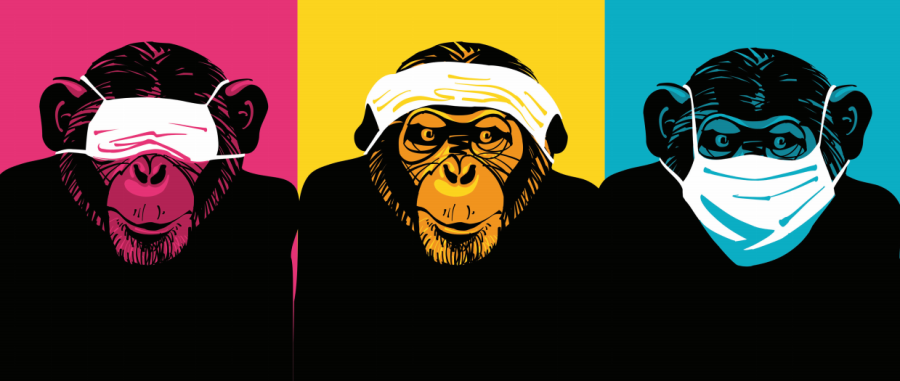Columns
Indifference is not an option
We must challenge the politicians and expose their treachery.
Naresh Koirala
As the Covid-19 crisis deepens, messages in my social media network get increasingly dark. I know, it is not just me. All of us are dreading the next 'ping' on our phones. There is hardly any Nepali not impacted by SARS-CoV-2. In response to my query on her welfare, my sister-in-law wrote, 'We are all dependent on Pashupatinath's goodwill.' A message from an activist from the Nepal Library Foundation read, 'We are all in the throes of death; be kind and compassionate to everyone.' A friend despaired, 'We are helpless. We do not have the most basic of the facilities required to save lives: Hospitals are crowded and refuse to accept any more patients; oxygen cylinders, ventilators, and vaccines are unavailable.' In the last three months, I have lost five of my near and dear ones to this disease. The country has lost thousands. As I write this, a close friend and my aunt are in hospital in critical condition.
About a month ago, I wrote a column in this paper titled 'Perspectives on pandemics'. In it, I argued that Covid-19 was perhaps nature's response to our indiscriminate destruction of the earth's habitats. I did not discuss Prime Minister KP Sharma Oli’s mismanagement of the public health crisis; his dereliction of duty. A young medical doctor, who seldom comments on my writings, wrote: 'Thank you very much for not bringing politics and Oli in your article.' These words summed up the doctor’s apathy with the current state of politics and disgust with politicians shared by millions of Nepalis.
I understand the apathy, but I am worried. How will Nepal move ahead if young, educated, self-respecting citizens become indifferent to national politics? After all, it is politics that drives the country. It is politics that has brought us where we are: good, bad and all.
Understanding the apathy
The apathy speaks to people's helplessness. It is not a lack of interest but a surrender to the evils of Nepal’s politics. It is borne out of our citizens' inability to bring to account corrupt, incompetent, self-aggrandising politicians who have taken the country to ransom for personal and partisan benefit. Take, for example, Prime Minister Oli’s mismanagement of the virus.
For the last 18 months, Oli’s party, first the Nepal Communist Party and after its break-up the CPN-UML, has been embroiled in an intraparty power struggle. Oli’s adversaries accuse him of monopolising government power (read benefits from power) and not sharing it equitably among the party leaders. While the fight was going on, the government was caught in a corruption scandal in the procurement of personal protective equipment. Members of Oli’s coterie were allegedly complicit. It got so bad, the procurement contract had to be torn.
With the surge in infections and deaths due to a total lack of preparedness, Oli took to defending his position internationally. On May 8, he told a CNN reporter, 'The virus is under control.' He blamed the 'undisciplined' public who participated in crowded events for the surge in infections. His party had organised these events (political rallies) and he was the key speaker. Two days after the CNN report, The Guardian published an article by KP Oli appealing to the government of the United Kingdom for help to fight the virus. The prime minister does not have any plan for managing Covid-19; he simply reacts to the moment. His focus in the last few months has been using the services of the complicit President Bidya Devi Bhandari, to defy the constitution, so he can hang on to power.
The latest Oli-Bhandari dance culminated in the darkness of the early morning of May 20 when the president drew her presidential sword, which experts agree is unconstitutional, to axe Parliament for the second time in three months to save her prime minister. While all this was happening, people continued to die in the hundreds for lack of oxygen cylinders; vaccines are not even in sight.
The Nepali people have endured bad politics and corrupt politicians for decades. They had pinned a lot of their hopes on Oli. They gave him a near two-thirds majority in Parliament and expected him to turn politics from an instrument of public loot to a vehicle committed to public service. When he turned out to be another charlatan, not averse to even repeatedly trashing the constitution to hang on to power, little wonder if the ordinary public became indifferent to politics. Alas! Indifference does not solve problems.
Totalitarianism takes over
Indifference is the abandonment by the people of their relationship with the government. This is exactly what government leaders with authoritarian tendencies want. Once the relationship is abandoned, the government is free to do whatever it wants. What that means is more political corruption, more misery for the ordinary people, and public administration driven by the leader's whim instead of the rule of law. When indifference becomes widespread, the government slides into authoritarianism, democracy declines and totalitarianism takes over. This is what is happening in Russia under Putin. This will continue until, eventually, another revolution takes place. History shows no dictatorship lasts forever.
It is over 70 years since we Nepalis started imagining a prosperous democratic Nepal. During this period, we have had two 'people’s movements' and four constitutions; we suffered from a brutal communist insurgency and 30 years of royal dictatorship. Thousands of people gave their lives so we could realise that imagination. Every time after a successful people’s movement, after a new constitution, we feel tantalisingly close to that dream, only to be frustrated by the same political leaders who we trusted to lead the revolution. It has been a difficult 70 years.
If we give in now and be indifferent to the political maladies, our children will inherit the same wretched state through which we lived our lives. We will dishonour the thousands who have given their lives for the betterment of the country. If we do not want that, we must hold our politicians to account. We must be involved and challenge them; expose their treachery. Indifference is not an option.




 13.12°C Kathmandu
13.12°C Kathmandu















